| Srl | Item |
| 1 |
ID:
127617
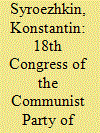

|
|
|
|
|
| Publication |
2013.
|
| Summary/Abstract |
The struggle at the very top of China's political establishment reached its peak on the eve of the 18th Communist Party Congress; this largely predetermined the balance of political forces in the upper echelons of the Communist Party and the decisions of its congress. The compromise about the top figures makes the party's political future very dim indeed. Although the retreating Hu-Wen Tandem managed to hold its ground, it is too early to say that the "reformers" have scored a final victory: in many respects the 18th Congress proved to be "transitional."
The final balance of power will become clear in five years' time after the next, 19th CPC Congress. It will probably clarify the course of the "fifth generation" of the country's leaders. It seems that the next five years can be best described as time of compromises. One has to admit that the criticized Hu-Wen Tandem left the country in fairly good shape; it compiled a reasonable "roadmap" with no alternative on the horizon.
It remains to be seen whether the new party and country leaders will manage in the next five years to avert social upheavals and fulfill the tasks formulated by the 18th Congress while following the roadmap.
|
|
|
|
|
|
|
|
|
|
|
|
|
|
|
|
| 2 |
ID:
160649
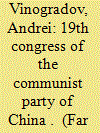

|
|
|
|
|
| Summary/Abstract |
This article considers the main provisions and possible domestic and foreign consequences of the 19th Congress of the Communist Party of China. Special attention is given to the main tenets of the era's theory of socialism with a Chinese face; the problems, conflicts, and challenges China faces from today's world development; the need to change China's model of development; and the role of Xi Jinping in shaping the CPC's ideological and theoretical doctrine.
|
|
|
|
|
|
|
|
|
|
|
|
|
|
|
|
| 3 |
ID:
114588
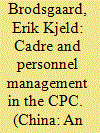

|
|
|
|
|
| Publication |
2012.
|
| Summary/Abstract |
This article addresses some of the most important mechanisms and instruments in the Communist Party of China's (CPC) management of key officials and administrative personnel: Party and state cadres in administrative organs and institutions. These mechanisms include control over the administrative layout in terms of organs and positions (bianzhi), the authority to appoint leading personnel (nomenklatura), as well as a sophisticated cadre transfer system - which also involves rotation between big business and the political world. The article not only emphasises the crucial importance of cadre management in understanding the fundamentals of the Chinese power system, but it also points to a number of challenges in studying this particular Chinese form of personnel management. It shows the elaborate nature of cadre and personnel management in China and argues that in recent years the Party has strengthened rather than weakened its role in managing the cadre corps. Finally, the article draws on theoretical insights provided by the existing body of literature on elites in general and in relation to China in particular.
|
|
|
|
|
|
|
|
|
|
|
|
|
|
|
|
| 4 |
ID:
083868
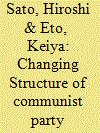

|
|
|
|
|
| Publication |
2008.
|
| Summary/Abstract |
This paper examines changes in the membership structure of the Communist Party of China during the 1990s. It concentrates on urban China to investigate the relationship between socioeconomic characteristics of the region (city) and the age, educational, and occupational structures of the regional party. The major findings are as follows. First, the development of marketization has widened opportunities for the younger generation to achieve socioeconomic success outside party membership. Second, the younger generation's incentives for joining the party have consequently been increasingly important determinants of the party's membership structure. Third, the subsequent technocratic reorganization of the urban party seems to have progressed through the conventional bureaucratic-elite path in the government and publicly owned sectors rather than through the newly emerging qualified professional-elite path
|
|
|
|
|
|
|
|
|
|
|
|
|
|
|
|
| 5 |
ID:
045198
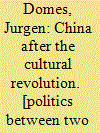

|
|
|
|
|
| Publication |
London, C Hurst and company, 1975.
|
| Description |
xii, 283p.: tableshbk
|
| Standard Number |
0903983435
|
|
|
|
|
|
|
|
|
|
|
|
Copies: C:1/I:0,R:0,Q:0
Circulation
| Accession# | Call# | Current Location | Status | Policy | Location |
| 017011 | 951.05/DOM 017011 | Main | On Shelf | General | |
|
|
|
|
| 6 |
ID:
123303
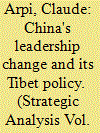

|
|
|
|
|
| Publication |
2013.
|
| Summary/Abstract |
Two new factors have appeared on the Tibetan political scene after the recent leadership change in China. First, the 'spiritualisation' of politics: paradoxically, the atheist Chinese Communist Party (CCP), also known as The Communist Party of China (CPC) seems increasingly interested in 'spiritual' matters. The CCP has started promoting reincarnated Lamas, known in China as 'Living Buddhas', in a big way. The purpose is to prepare for the post-Dalai Lama era. The second new development is the emergence of a 'Tibet Gang'. A string of officials who have been posted to or connected with Tibet at one point or another in their career have now joined the Politburo, the government or the top rung of the Party. This article will study these developments and look at the possible implications.
|
|
|
|
|
|
|
|
|
|
|
|
|
|
|
|
| 7 |
ID:
183991
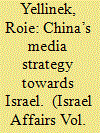

|
|
|
|
|
| Summary/Abstract |
This article examines China’s media strategy and activities towards Israel, underscoring its recent increase in intensity. By way of doing so, the article explores Beijing’s use of journalism and other Israeli media outlets on the one hand, and the employment of direct Chinese soft power tools, from China Radio International (CRI), to the establishment of Chinese institutes in Israel, to public and media activities of Israel-based Chinese diplomats.
|
|
|
|
|
|
|
|
|
|
|
|
|
|
|
|
| 8 |
ID:
119141
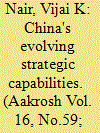

|
|
|
| 9 |
ID:
023938
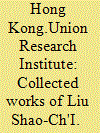

|
|
|
|
|
| Publication |
Hong Kong, Union Research Institute, 1968.
|
| Description |
xvi, 405p.Hbk
|
|
|
|
|
|
|
|
|
|
|
|
Copies: C:1/I:0,R:0,Q:0
Circulation
| Accession# | Call# | Current Location | Status | Policy | Location |
| 002187 | 923.20951/UNI 002187 | Main | On Shelf | General | |
|
|
|
|
| 10 |
ID:
184631
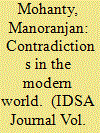

|
|
|
| 11 |
ID:
127465
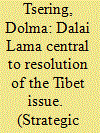

|
|
|
|
|
| Publication |
2014.
|
| Summary/Abstract |
Since June 2013, there has been a spate of activity on the Tibet controversy. Sparking it off was the interview of Professor Jin Wei1 from the Central Party School in Asian Weekly2 on June 6, entitled 'Reopen Talks and Resolve Tibetan Issues', in which she advocated engaging the Dalai Lama rather than demonising him. Soon after, the International Campaign of Tibet reported that China had lifted the 17-year ban on the display of Dalai Lama portraits in Sichuan and Qinghai. On the other hand, on July 6, the Tibetans who had gathered to mark the 78th birth anniversary of the Dalai Lama in Tuwa county were fired upon by Chinese security forces. The State Administration for Religious Affairs reiterated: 'Our policy toward the Dalai clique is clear and consistent, and has not changed'.3 Yu Zhengsheng, a member of the Standing Committee of the Political Bureau of the Communist Party of China (CPC) declared: 'Only when the Dalai Lama publicly announces that Tibet is an inalienable part of China since ancient times, gives up the stance of "Tibet independence" and stops his secessionist activities, can his relations with the CPC Central Committee possibly be improved'.4 These developments suggest that China continues to remain serious about resolving the Tibet issue, especially regarding the Dalai Lama's role. This commentary seeks to analyse different aspects of understanding on the Dalai Lama's role in the resolution of the Tibet issue.
|
|
|
|
|
|
|
|
|
|
|
|
|
|
|
|
| 12 |
ID:
118452
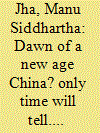

|
|
|
| 13 |
ID:
170796
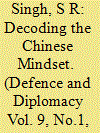

|
|
|
|
|
| Summary/Abstract |
At the behest of Hu Jintao, the president of the People’s Republic
of China (PRC), top Chinese scholars carried out a study on factors
that had enabled the major powers to grow very rapidly since the
15th century.1
The study was ordered on November 24, 2003, during
the Communist Party of China (CPC) Central Committee Political
Bureau’s group session and the final work was completed in 2006
|
|
|
|
|
|
|
|
|
|
|
|
|
|
|
|
| 14 |
ID:
083257
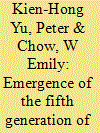

|
|
|
|
|
| Publication |
2008.
|
| Summary/Abstract |
The Hu Jintao regime is likely to remain in power until the Eighteenth National Congress of the Communist Party of China (CPC) in late 2012. It must, however, pick or groom a suitable elite and leaders to succeed Hu. The successors need to learn to navigate within the safe zones of a series of dialectical models to maintain the mainstream market-economy line of the CPC leadership within the context of Chinese Communism.
|
|
|
|
|
|
|
|
|
|
|
|
|
|
|
|
| 15 |
ID:
102993
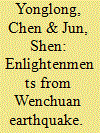

|
|
|
| 16 |
ID:
140584
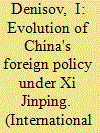

|
|
|
|
|
| Summary/Abstract |
XI JINPING has been more successful than his predecessor, Hu Jintao, in consolidating China's system of government. The domestic political agenda of the "Xi-Li rule" (Li Keqiang is prime minister and an ideologue of the "fifth generation") with the institutions and mechanisms that it has brought into being has taken even less time to put together than observers generally expected. This is the result of Xi's style of governance and new and more difficult challenges that have needed prompt reactions, chiefly internal Communist Party issues that had obviously been the new leader's priorities until mid-2013 or even later.
|
|
|
|
|
|
|
|
|
|
|
|
|
|
|
|
| 17 |
ID:
095190
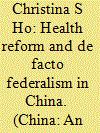

|
|
|
|
|
| Publication |
2010.
|
| Summary/Abstract |
Understanding China as a de facto federalism can generate explanations and recommendations concerning the path of China's health reform. The first section reviews how de facto federalism drove the historical development of the problems plaguing China's health system. The next section shows how certain features of the current reform plan, namely, the plan's ambivalence between government and market approaches and its lack of strong centralisation, can be explained by de facto federalism. The third section uses the hypothesis of de facto federalism to generate two courses of action - one cautionary; the other, aspirational - that could be considered for the future. The consequences for the health sector of under-articulated federalism are clarified and point to the need for discursive reasoned elaboration, as opposed to political bargaining alone, in federalism.
|
|
|
|
|
|
|
|
|
|
|
|
|
|
|
|
| 18 |
ID:
110047
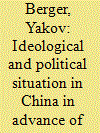

|
|
|
|
|
| Publication |
2011.
|
| Summary/Abstract |
As the 18th congress of the CPC, which is supposed to renovate the leadership of the ruling party and adopt programmatic directives on the crucial questions of the country's development for the period up to 2020, is drawing closer, a dialogue and confrontation between various ideological and political groups (both between themselves and with central power and various groupings within it) tend to intensify. The left-wing forces and their liberal or social-democratic opponents take an active part in rivalry.
|
|
|
|
|
|
|
|
|
|
|
|
|
|
|
|
| 19 |
ID:
149061
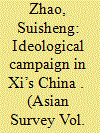

|
|
|
|
|
| Summary/Abstract |
President Xi Jinping has launched the largest ideological campaign in post-Mao China, which has brought a Maoist revival. But Xi is not in a position to make a full return to the Mao era because ideologically driven repression offers no long-run solution to China’s problems. Drawing on elements of Mao’s legacy, Xi aims to rebuild the regime’s legitimacy when it is increasingly vulnerable to economic slowdown and public anger about corruption, income disparity, and pollution, an embarrassing confession of regime fragility.
|
|
|
|
|
|
|
|
|
|
|
|
|
|
|
|
| 20 |
ID:
128928
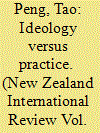

|
|
|